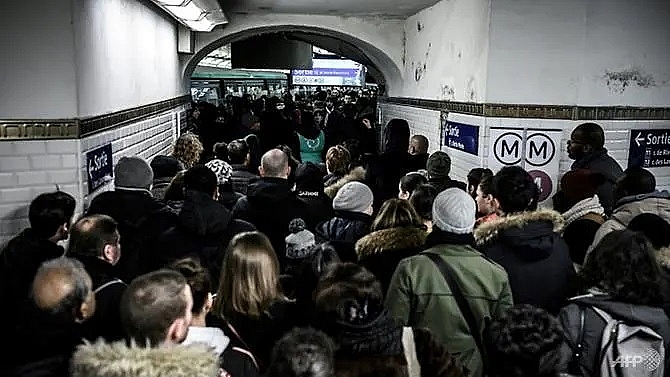France braces for holiday misery as pension strike persists
 |
| Commuters on the Paris metro faced another day of travel havoc Thursday as unions pressed their strike against a planned pension reform. (Photo: AFP/Philippe LOPEZ) |
Officials have said they are ready to negotiate, with Education Minister Jean-Michel Blanquer meeting teachers' representatives on Friday to try to stave off another day of class shutdowns.
"It was an intense and frank meeting ... but we still need details, and maintain our call to strike on Tuesday," Stephane Crochet of the SE-Unsa teachers' union said.
Unions are hoping for a repeat of 1995, when they forced a rightwing government to back down on pension reforms after three weeks of metro and rail strikes just before Christmas.
The prospect of a protracted standoff has businesses fearing big losses during the crucial year-end festivities, and travellers worried that their holiday plans are compromised.
"Right now it's a catastrophe here, but we're hoping there will be a solution before Christmas," Frederic Masse, a foie gras producer at the sprawling Rungis wholesale food market south of Paris, told AFP on Friday.
The capital city was again choked by huge traffic jams as most metro lines remained shut, only a handful of buses and trams were running, and three in four TGV trains were cancelled.
Officials warned on Friday of similar disruptions through the weekend, with train operator SNCF saying that on Tuesday it will start warning ticket holders of their chances of travel during the Christmas break that begins next Saturday.
"I'm sick of this, and I won't be able to keep working if it goes on," Zigo Makango, a 57-year-old security agent, told AFP onboard a bus in the Bobigny suburb northeast of Paris.
To get home at night Makango said he has to use taxis, but "my boss doesn't reimburse me for that".
'HISTORIC REFORM'
President Emmanuel Macron on Friday expressed his "solidarity" with people impacted by the strike, "but I want the government to continue its work" in forging a single pension system, a key campaign promise.
"It's a historic reform for the country ... for a welfare state of the 21st century," he told journalists at an EU summit in Brussels.
The overhaul, unveiled this week by Prime Minister Edouard Philippe, would do away with 42 separate regimes, some of which offer early retirement and other benefits to public-sector employees such as train drivers, dockers and even Paris Opera employees.
But Philippe angered unions further by proposing a reduced payout for people who retire at the legal age of 62 instead of a new, so-called "pivot age" of 64.
They have called for new mass demonstrations for next Tuesday, the third since the action started on Dec 5 in the biggest show of strength in years by France's notoriously militant unions.
Philippe insisted on Twitter that "My door is open and my hand outstretched".
But Laurent Brun of the hard-line CGT union, the largest among public-sector workers including those at rail operator SNCF, has already warned "There won't be any Christmas truce" unless the government drops the plan entirely.
FRANCE DIVIDED
A poll released Thursday by the Elabe institute found France evenly divided on Philippe's plan, with 50 per cent for and 49 per cent against.
But 54 per cent rejected the mooted 64-year cutoff for a full pension, and 54 per cent supported the protest.
Staff at four of France's eight oil refineries were on strike Friday, affecting output and raising fears of shortages down the line.
And both Paris operas, the Garnier and the Bastille, again cancelled Friday performances and others through the weekend.
Macron's government insists the changes will make for a fairer system and help erase pension system deficits forecast to reach as much as €17 billion (US$19 billion) by 2025.
The average French person retires at just over 60, years earlier than most in Europe or other rich OECD countries.
What the stars mean:
★ Poor ★ ★ Promising ★★★ Good ★★★★ Very good ★★★★★ Exceptional
 Tag:
Tag:
Related Contents
Latest News
More News
- Russian President congratulates Vietnamese Party leader during phone talks (January 25, 2026 | 09:58)
- Worldwide congratulations underscore confidence in Vietnam’s 14th Party Congress (January 23, 2026 | 09:02)
- Political parties, organisations, int’l friends send congratulations to 14th National Party Congress (January 22, 2026 | 09:33)
- 14th National Party Congress: Japanese media highlight Vietnam’s growth targets (January 21, 2026 | 09:46)
- 14th National Party Congress: Driving force for Vietnam to continue renewal, innovation, breakthroughs (January 21, 2026 | 09:42)
- Vietnam remains spiritual support for progressive forces: Colombian party leader (January 21, 2026 | 08:00)
- Int'l media provides large coverage of 14th National Party Congress's first working day (January 20, 2026 | 09:09)
- Vietnamese firms win top honours at ASEAN Digital Awards (January 16, 2026 | 16:45)
- ASEAN Digital Ministers' Meeting opens in Hanoi (January 15, 2026 | 15:33)
- ASEAN economies move up the global chip value chain (December 09, 2025 | 13:32)






















 Mobile Version
Mobile Version